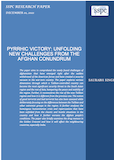TM: "India Bans Ghaznavi Force, the Jammu and Kashmir-based Terrorist Group"
On February 17, the Indian government banned the Kashmir-centric Islamic militant group called the Jammu and Kashmir Ghaznavi Force (JKGF) (egazette.nic.in, February 17). A relatively new entrant in the Kashmir landscape, JKGF emerged as a hybrid strike unit comprised of highly trained cadres of Pakistan-based Tehreek-ul-Mujahideen (TuM), Lashkar-e-Taiba (LeT), and Jaish-e-Muhammed (JeM).

